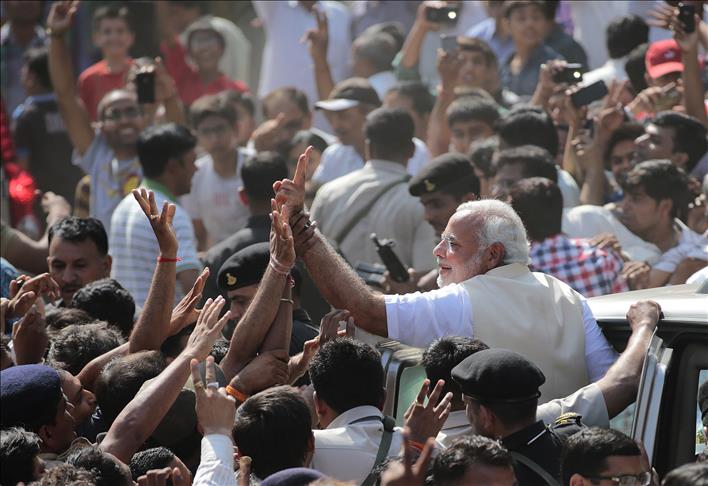Narendra Modi: tea-seller to India's prime minister
The Hindu nationalist with business backing, Narendra Modi will be India's next prime minister.

NEW DELHI
From a nondescript railway platform to the prime minister's residence in Delhi, Narendra Damodardas Modi's rise to the pinnacle of Indian politics has involved social barriers and political controversies – and he has thrived on that story. The Bharatiya Janata Party's leader, who was born to a lower-caste Hindu family in 1950, has used campaign speeches to proudly recollect his time as a "chaiwallah" in a Gujarat railway station, ignoring the rival Congress party's jibes about his tea-selling past.
Modi's political journey started when, after a period wandering the Himalayas in search of a "higher calling", he joined the right-wing Hindu cultural organization Rashtriya Swayamsevak Sangh. He then joined the more political BJP in 1985, when it was heavily involved in a public dispute about the building of a Ram temple in Uttar Pradesh which eventually led to the destruction of a mosque at the site.
The former "chaiwallah" made his first significant step into the political sphere in 2001 when the BJP leadership, impressed by his organizational and oratory skills, made him Gujarat's chief minister.
Soon after his appointment came one of the darkest blots on his political record, and the reason many in the country are wary of him as prime minister.
Inter-communal riots in western state Gujarat in 2002 killed up to 2,000 people, most of them Muslims. They started when a train coach carrying Hindu pilgrims caught fire, killing 58. Modi had the bodies displayed in the main city Ahmedabad. The attack was blamed on Muslims and mob violence ensued over the next three days. Though a Supreme Court investigation said there was no prosecutable evidence against Modi, he has not been able to escape the blame for complicity or negligence as chief minister. He has also never apologized for failing to stop the riots, only ever expressing "regret."
Despite the controversy surrounding him, calls for Modi to be the BJP's prime ministerial candidate became audible after his third consecutive victory in 2012 Gujarat state elections. Stiff resistance from party stalwarts was overcome by the party's impatience after 10 years of sitting in opposition. It faced a leadership crisis and Modi was admired for his assertive leadership style.
Political analysts and Modi's critics have often portrayed him as divisive and communal-minded; his attempts to counter that image, by changing his demeanour depending on his audience, have only led to confusion about what exactly his message is. In recent weeks Modi told a crowd in West Bengal that he will expel Bangladeshi Muslims migrants, while also telling an Urdu daily he wants Indian Muslims to carry a Qur’an in one hand and laptop in another. When voting finished on May 12, Modi wrote on his blog: “Let's place people over politics, hope over despair, healing over hurting, inclusion over exclusion and development over divineness. It is natural for the spirit of bi-partisanship to get temporarily lost in the midst of an election campaign but now is the time to resurrect it.”
Modi's much-publicized Gujarat “model of development” has divided the country’s leading economists at a time when the Indian economy has been sapped of energy. Described by some as "pro-business", India's industrialists have happily backed Modi as the leader they believe will best serve their interests. One example of his eagerness to cater for those interests was when, days after one of India's biggest automobile companies, Tata Motors, had been expelled from West Bengal, Modi offered and assigned the company land for a factory in Gujarat.
But the success of his economic record has also been questioned; Modi did not have to transform Gujarat's economy, it was already one of the strongest in the country, and other states performed just as well as Gujarat in the same period. Child malnutrition remains exceptionally high, with 5,000 malnourished children in the city of Ahmedabad alone, according to Gujarat government records. It has also been claimed that up to 7,000 Gujurati farmers have committed suicide during Modi's tenure.
Despite Modi's own controversial record, he has led the BJP to a landslide victory in India's national elections and will be tested over his coming term on whether he can avoid communal tensions, create jobs and repair the economy.
englishnews@aa.com.tr


